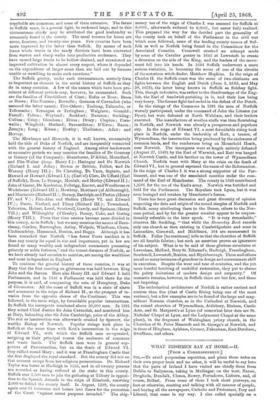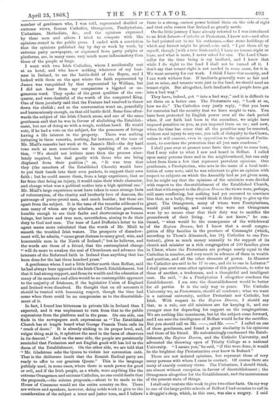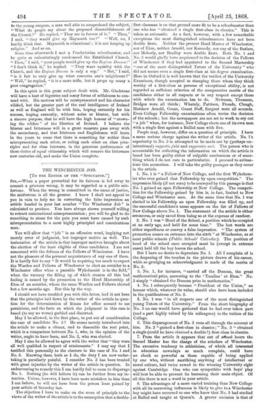WHAT IRISHMEN SAY AT HOME.—IL [FROM A CORRESPONDENT.]
SIR,—To avoid purposeless repetition, and place these notes on their own proper basis and no other, it will be useful to say here that the parts of Ireland I have visited are chiefly those from Dublin to Ballymena, taking in Mullingar, on the west, Navan, Drogheda, Dundalk, Clones, Newry, Portadown, Lisburn, and, of course, Belfast. From some of these I took short journeys, on, foot or otherwise, meeting and talking with all manner of people, and buying all the newspapers, Catholic and Protestant, Tory and Liberal, that came in my way. I also called specially on- a.
number of gentlemen who, I was told, represented decided or extreme views, Roman Catholics, Orangemen, Presbyterians, Unitarians, Methodists, &c., and the opinions expressed by these men and others I tried to compare with like opinions stated in the public press. I ended with a conviction that the opinions published day by day or week by week, by extreme party newspapers, or expressed from party pulpits or platforms, are, in many cases, very much more inflammatory than those of the people at large.
I went with two Irish Catholics, whom I accidentally met at an hotel, and who knew nothing whatever of my busi- ness in Ireland, to see the battle-field of the Boyne, and I looked with them on the spot where the faith represented by James was vanquished by that represented by William, but I did not hear from my companions a bigoted or un- generous word. They spoke of the great qualities of the con- queror, and were doubtful of the worth of the conquered King. One of them jocularly said that the Fenians had resolved to throw down the obelisk ; and so the conversation went on, peacefully and harmoniously enough, on that old battle-field. Some time after- wards the subject of the Irish Church arose, and one of the same gentlemen said that he was in favour of abolishing the Establish- ment, but not of doing so with a rough, reckless hand. He would vote, if he had a vote on the subject, for the possessors of livings Laving a life interest in the property. There was nothing irritating in these remarks, nothing, for instance, of the tone of Mr. Mars remarks last week at St. James's Hall—the dry hard tone such as men sometimes use in speaking of an execu- tion, " We should not irritate more than the process abso- lutely required, but deal gently with those who are being displaced from their position ;" or, " It was true that they (the members of the Established Church) would have to put their hands into their own pockets, to support their own faith ; but he could assure them, from a large experience, that so far from that being an injury, it would raise their whole character, and change what was a political motive into a high spiritual one." Mr. Miall's large experience must have taken in some strange facts of voluntaryism, of the charity and brotherly love of deacons, the patronage of purse-proud men, and much besides ; but these are apart from the subject. It is the tone of the remarks addressed to men many of whom are ripe scholars, and Christian gentlemen, humble enough to see their faults and shortcomings as human beings, but brave and true men, nevertheless, aiming to do their duty to God and men. The tone of Lord Dufferin's letter to his agent seems more calculated than the words of Mr. Miall to smooth the troubled Irish waters. The prospects of disendow- ment will, he admits, "cause great distress to many good, wise, and honourable men in the North of Ireland ;" but he believes, and the words are those of a friend, that the contemplated change " will do more to awaken the zeal of Churchmen and advance the interests of the Reformed faith in Ireland than anything that has been done for the last three hundred years."
A gentleman whom I met a little farther north than Belfast, said he had always been opposed to the Irish Church Establishment, but that it had strong support, and from its wealth and the education of many of its members and allies would be no contemptible opponent to the majority of Irishmen, if the legislative Union of England and Ireland were dissolved. He thought that on all accounts it should be treated with becoming respect, though the time had come when there could be no compromise as to the disestablish- ment of it.
In fact, I found less bitterness in private life in Ireland than I expected, and it was unpleasant to turn from that to the public expressions from the platform and in the press. On one aide, one finds in the newspapers such expressions as "The Established Church has at length heard what George Francis Train calls its ' crack of doom.' It is already sinking to its proper level, and, vulgar thing asit is, it splutters the mud in the faces of observers in its descent." And on the same side, the people are persistently reminded that Fenianism and not English good-will has led to the doom of the Establishment. On the other side, we are told that " Mr. Gladstone asks the Queen to violate her coronation oath.
That is the deliberate insult that the Romish Radical party are ready to offer to our gracious Queen." This is the language publicly used, in some cases, where there is much power for good or evil, and if the Irish people, as a whole, were anything like the extreme Orangemen and extreme Catholics, no one could doubt that the proposals,—the solemn proposals,—about to be made to the House of Commons would set the entire country on fire. There are writers and speakers, however, doing noble work to give to the consideration of the subject a truer and juster tone, and I believe there is a strong, earnest power behind them on the side of right and that calm reason that Ireland so greatly needs.
On the little journey I have already referred to I was introduced to an Irish farmer—Catholic or Protestant, I know not—and after he had pointed out to me his outhouses,—fine stone buildings of which any farmer might be proud,—he said, " I put them all up myself, though [with a true Irish smile] I have no tenant-right or lease, and what is more, I never asked for one. The Lord Chan- cellor for the time being is my landlord, and I know that while I do right to the land I shall not be turned off it. I don't say that tenant-right is not needed in some cases, for it is. We want security for our work. I think I have that security, and I can work without fear. If landlords generally were as fair and just as mine, and tenants were just to the land, we should need no tenant-right. But altogether, both landlords and people have got into a bad way."
They have, indeed, got " into a bad way," and it is difficult to set them on a better one. The Protestants say, " Look at us, how we do." The Catholics very justly reply, "But you have for centuries had the security that we have sought in vain. You have been protected by English power over all the dark period when, if our faith had been in the ascendant, we might have imposed penalties on you, as you imposed them on us ; and now, when the time has come that all the penalties may be removed, without real injury to anyone, you talk of disloyalty to the Crown, unless it will consent, even in opposition to the opinion of Parlia- ment, to continue the protection that all just men condemn."
I shall pass over at present some facts that ought to come here, that I may refer to what I saw and heard in Belfast. I called upon many persons there and in the neighbourhood, but can only select from them a few that represent prevalent opinions. One gentleman, a Presbyterian, who acts in the name of a local insti- tution of some note, said he was reluctant to give an opinion with respect to subjects on which the Assembly had as yet given none, but he might say that the opinions of the ministers were divided with respect to the disestablishment of the Established Church, and that with respect to the Regium Donum the views were, perhaps, still more conflicting, but nothing had yet occurred to convince him that, as a body, they would think it their duty to give up the grant. The Orangemen, many of whom were Presbyterians, would yield nothing, and many who were not Orangemen were by no means clear that their duty was to sacrifice the groundwork of their living. " I do not know," he con- tinued, " what would be the consequence of the withdrawal of the Regium Donum, but I know that a small congre- gation of fifty families in the province of Connaught (which, according to Thom's Almanack, has 181 Catholics to one Pro- testant), gives as much money annually to the support of its church and minister as a rich congregation of 500 families gives in Ulster, where the Protestants are perhaps nearly equal to the Catholics in number, and very much in advance of them in wealth and position, and all the other elements of power. In Munster the Catholics are said to be 17 to one, and six to one in Leinster." I shall pass over some other opinions of this gentleman, to refer to those of another, a tradesman, and a thoughtful and intelligent man. He said, " As a Presbyterian I altogether condemn the Establishment. I am sure the disestablishment would be better for all parties. It is the only way to peace. The Catholic University we, as Protestants, should all condemn ; what we want is a national university, neither Protestant nor Catholic, but Irish. With respect to the Regium Donum, I should say that, as a rule, our old ministers are for keeping it, and our
younger ones for depending for support on the congregations. We are nothing like unanimous, but let the subject come forward, and I am sure the intelligence of Belfast would be for the sacrifice.
But you should call on Mr. —, and Mr. —." I called on one of these gentlemen, and found a great similarity in his opinions
and those of his friend. He unhesitatingly condemned the Estab- lishment, the Regium Donum, and the Catholic University, and advocated the throwing open of Trinity College as a national University. " I assure you," he said, "if this were done, it would be the brightest day Protestantism ever knew in Ireland."
These are not isolated opinions, but represent those of very many persons with whom I came in contact. Of course there are many of exactly contrary views. The Unitarians, I should think, are almost without exception in favour of disestablishment ; the Orangemen altogether for the Establishment, and the maintenance of the present state of things.
I shall only venture this week to give two other facts. On my way to one of the large public schools of Belfast I had occasion to call in a druggist's shop, which, in this case, was also a surgery. I said to the young surgeon, a man well able to comprehend the subject, "What do people say about the proposed disestablishment of the Church ?" He replied, " They are in favour of it." " Then," I said, " they would give up Maynooth too ?" " Well, no, I hardly think that. Maynooth is educational ; it is not keeping up religion." And so on.
Some time afterwards I met a Presbyterian schoolmaster, and he quite as unhesitatingly condemned the Established Church. " Then," I said, " your people would give up the Regium Donum?"
"I don't think it," he replied. " They want equality with the Church, and the Regium Donum is only a sop." "But," I said, " is it fair to only give up what concerns one's neighbours ?" " Well," he replied, "it is a mere trifle, but it props up many a poor congregation."
In this spirit is this great subject dealt with. Mr. Gladstone will have a host of bigotries and many forms of selfishness to con- tend with. His motives will be misrepresented and his character vilified, but the greater part of the real intelligence of Ireland as well as England will be with him, hoping earnestly for his success, hoping earnestly, without noise or bluster, but with a sincere purpose, that he will have the high honour of "crown- ing the edifice " of the liberties of Ireland. I believe the bluster and bitterness will in a great measure pass away with the ascendancy, and that Irishmen and Englishmen will learn in the years to come that there is something far nobler than misrepresenting each other, or ruling each other on class prin- ciples and for class interests, in the generous performance of those duties of equal citizenship which will remove the bitterness now centuries old, and make the Union complete.




































 Previous page
Previous page